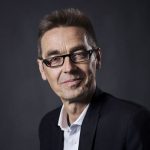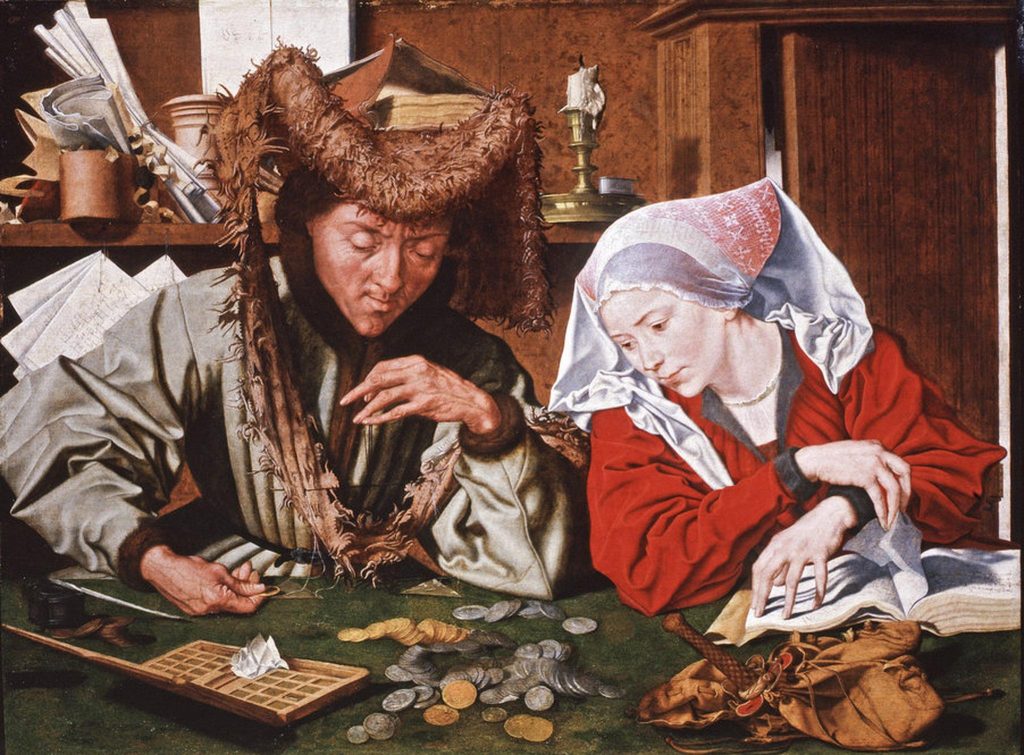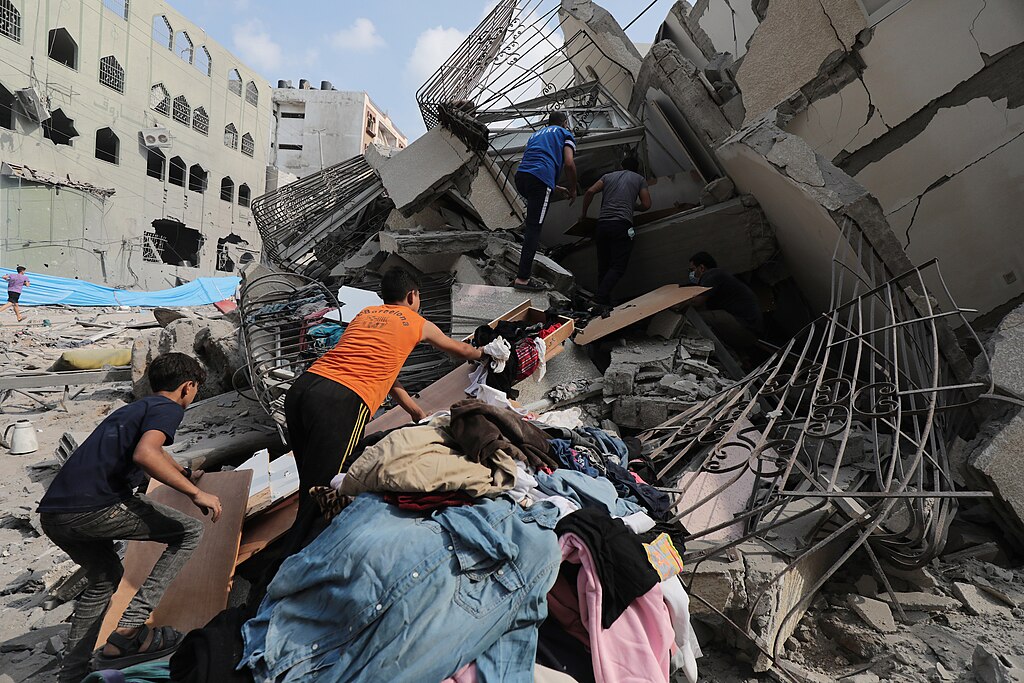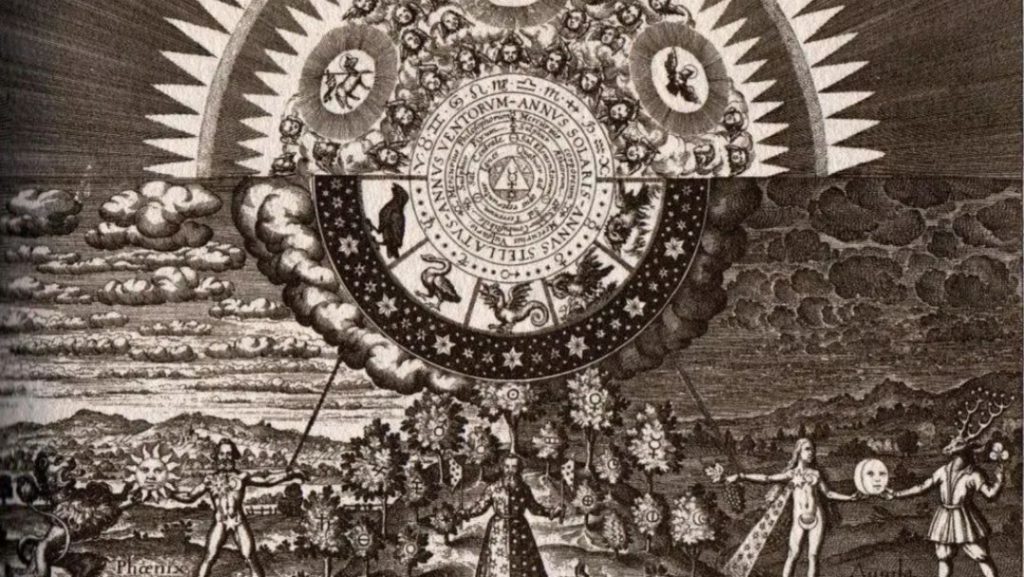Collective Trauma and Our Emerging Future
Dr. Claus Otto Scharmer
MIT SENIOR LECTURER, FOUNDER OF THE PRESENCING INSTITUTE
Thomas Hübl
SPEAKER, AUTHOR, AND FOUNDER OF THE ACADEMY OF INNER SCIENCE
Thomas | I’m so happy that you are with us today, Otto. First of all, a very warm welcome and thank you for joining us so generously here at the Summit.
Otto | Thank you for having me. It’s a real joy and pleasure, Thomas, to reconnect with you personally after our first meeting here in Cambridge, and the virtual conversation we had a few months ago. I really look forward to continuing this conversation.
Thomas | I think that it’s perfect to have this conversation now, exploring a multidisciplinary approach to the phenomenon of collective trauma. How does it affect our social systems? How does it affect our political system? There are so many layers from personal health up to global questions.
Otto | The issue of trauma just in my own experience over the past decade or so, particularly over the past five or so years, seems to be increasingly coming up wherever I go. So, whenever you work with social systems, with deeper levels of systems change, you bump into that phenomenon. On an individual level, but very often on a collective level, we have to deal with the phenomenon of trauma. I’m not really any specialist on trauma, but from my professional expertise—which is awareness-based systems change, working with collective larger systems and deep change into learning processes—I’m bumping into it all the time.
Thomas | And something that you also told me in the pre-conversation that resonates a lot with my experience and working in this collective trauma process is, actually, that trauma and collective trauma creates absence. There is a part of me that is disembodied, there is a part of my emotional experience I cannot inhabit. There is maybe a part of my mental capacity that might shut down. There’s definitely a part of my relational capacity that is being hurt, and so on, into social systems. Because you worked a lot on the Theory U, which I think many people may have heard about, I would love to hear you speak a bit about the principle of absence or absencing that you developed.
Otto | Yes, I’m happy to do that. Some 28-plus years ago, I came here to MIT in Boston, because of the systems thinking framework, and really how to address the bigger issues of our time with that framework. It is basically the distinction between visible behavior—what appears more on the surface on the one hand—and that which doesn’t appear—the deeper structures, the paradigms of thought, and the deeper sources from which our thinking, from which awareness, consciousness and action, is arising from. So, it’s this distinction between symptoms and these deeper root issues. . . . And when you think about the symptoms today, in the Theory U context, I see three major divides happening in many countries and contexts and systems. The ecological divide, the social divide, and the spiritual divide, which arise from the disconnect from self to nature, self to other, and self to self. That’s just the background.
When we look at that, then the question of trauma really is, on the one hand, that history and many issues we have in our society are reenactments of trauma. Violence usually happens when you reactivate the trauma. We cannot understand the Middle East without the Crusades. We cannot understand it without the Holocaust. They are deeper trauma; they can be activated, and then they result in violence. From one point you can say, history is a repetition of a reenactment of trauma from the past. And there’s a lot of evidence for that. But on the other hand, I think that may also be blinding us when we are just limited to that perspective.
There’s also something new happening. In the 20th century, it was totalitarianism with Hitler and Stalin and so on, that we hadn’t seen before. And in this century, something is happening that, again, cannot be understood with just a 20th century lens.
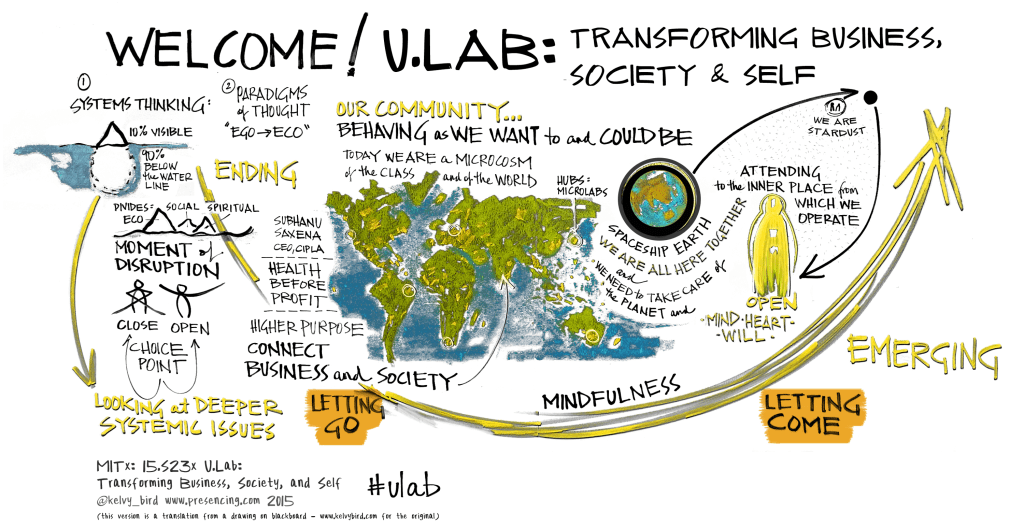
This image comes from my colleague in Cambridge, Kelvy Bird, who also is a cofounder of the Presencing Institute. And it depicts the current moment we are living in, which is a moment of disruption as seen on the left-hand side. And moment of disruption means we’re standing here, and the future is going to be different. We don’t know exactly how it will be different, we know less about that. But what we know the least about is actually how to move from here to there.
And the presencing perspective on this situation is a perspective that suggests that, in order to deal with disruption, in order to move from here to there, we have to go on a journey. In part, it is an outer journey, which means going to the edges of the system. And in part, it is an inner journey that connects to the deeper layers of our own experience. Because, if we connect to the true deep experience of the now, we realize that the future is already here. We realize that in our current experience, it’s not only based on the current reality or driven by the past, but that the future is already here in the deepest experience of the now. And the Theory U journey is basically a journey that brings together this outer and this inner journey.
When we talk about the current situation in the 21st century, one of the few things most people would agree on is that, yes, we do live in an age of disruption. That means the future is going to be different from the past. And we see, I believe, in all countries the same pattern, which is three types of responses. The first one is “same old, same old.” And that is something that, by the month, becomes less and less tenable. The two main responses that remain are: turning backward or leaning forward. Turning backward is basically grounded in, and operated by, a freeze reaction. Freezing the mind, the heart, and the will. Also known as ignorance, hate, and fear.
Leaning forward into something that we don’t know—leaning into the emerging future—requires us to open the mind, open the heart, and open the will, which now only works if we can access our capacity for curiosity, compassion, and courage. I call this the cycle of presencing. Becoming present and connecting with your highest future possibility. And the other one is absencing.
The journey of the ‘U’, or the journey of the presencing cycle, is basically a journey of seeing, sensing, and presencing. Presencing is really connecting to source. And the gateways, below, are the work of Francisco Varela, who is the founder of Mind & Life Institute and coauthor of On Becoming Aware. The essence of what he synthesized is the core process of becoming aware, where he synthesized meditation and phenomenology into three core capacities that he called suspending, redirecting, and letting go.
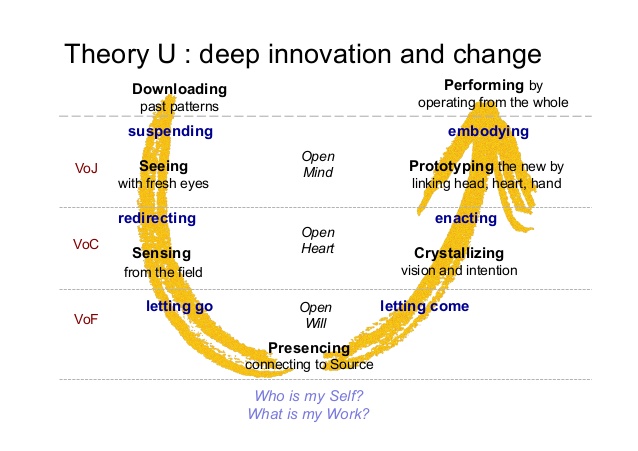
Those are the gateways into these capacities. Suspending old habits of thought leads to seeing with fresh eyes. That’s the open mind. Redirecting, now, in the social realm, I interpret as kind of looking at a situation not through my eyes, but the eyes of the other—empathic seeing and listening of the heart. And then the letting go, is letting go of the old and ‘letting come’ of what is wanting to emerge.
Now, the interesting thing about absencing is that it’s the exact mirror image. So, it’s not about seeing, but blinding. It’s not about sensing, but it’s de-sensing. Getting stuck inside your skin as an individual, but also in a collective skin. And it’s not about connecting to source and presencing, but disconnecting from your highest future possibility.
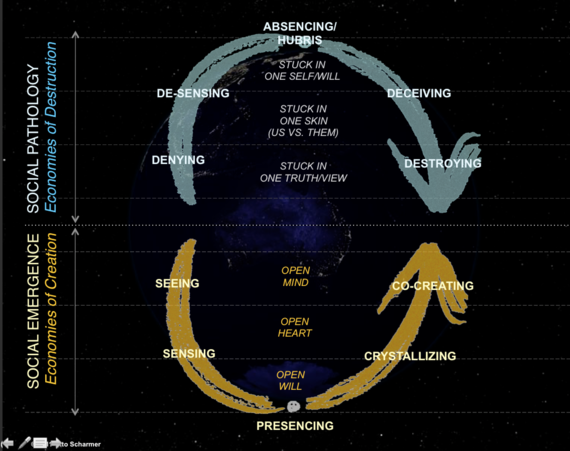
Absencing, and the gateways into that—denial, entrenching, and holding on—I probably don’t need to explain that we see a lot of this in our current society. We see societies falling apart. You can watch it here in the United States, but also in many other countries. It is a social phenomenon that we see in many different forms: we see it in politics, we also see it in the economy, and we see it in communication. Blinding and de-sensing means you are disconnecting horizontally. You’re disconnecting from what’s going on around you. And the absencing is the vertical disconnect. You disconnect from your higher self, from your highest future possibility.
One of the most significant developments over the past decades is that capitalism has shifted from a financial capitalism to a surveillance capitalism, which Shoshana Zuboff describes in her book, The Age of Surveillance Capitalism. So, manipulation, blaming others, we see those phenomena. And the result is enacting violence. I think about violence in terms of three. There’s direct violence and there’s structural violence. Structural violence is all violence where you have victims, but not a person seen as a perpetrator. For example, hunger, underdevelopment—these are forms of violence that we see in many countries. That’s structural violence. It’s the economic structure that’s behind it. It’s not an individual; it’s our collective actions. And then I think that there is actually a third type of violence, which I call attentional violence. And with that I mean attentional violence is to not see another person, another human being, in terms of their highest future possibility.
When you are not seen in a society, that’s a form of violence that is inflicted upon you, resulting in destruction of nature, other, and self—the three divides I mentioned earlier. Presencing is basically ‘letting come’; crystallizing; and giving birth to, prototyping, and then embodying, the new. It’s really about bringing something into reality, a dormant deeper potential. Kind of allowing that, and birthing that into reality—allowing something to grow within and then move into reality. . . . I think this might be a helpful contribution. Because it is a framework and a language that allows us to not only look at the trauma that has been generated in the past, but also to look at the deeper making of trauma and direct structural and attentional violence that is happening now, unique to our century. And in that, each of us is participating on either side of the equation, one way or another.
Thomas | Yes; first of all, amazing. I like the word “absencing” because I think it describes the absent part, the unseen part, which is buried and we don’t really know that it’s buried. I think that’s a very powerful description of many symptoms that are actually the result of what I would call the collective trauma field.
I often describe the collective trauma field as: imagine you’re growing up in an apartment and, all your life, you never took a step outside. And one day somebody visits you and asks you, “How does the house look from outside?” And you can’t tell them because you never saw it. You just saw your apartment from the inside. What I’m saying is that I believe none of us has ever seen the world outside of the thousands of years of trauma. But the thing is, the absent part of us is usually absent and only visible through symptoms, but never is the thing itself.
Maybe you can expand a little more on the danger of our time, also given technology. You have talked about steering collective behavior, manipulating collective behavior, and many other symptoms or issues. So, what is the potential dark side or dangerous side in our time with the current tech development? And maybe, what is a human centric or humane way of developing technology so that it really serves us?
Otto | When you look at the absencing cycle, it is kind of supercharged by technology and by tech companies. And that’s basically why Shoshana Zuboff and The Age of Surveillance Capitalism analysis is so important. Because you could say today in the world, there are really two narratives going on. It’s the absencing story and all the problems around that. And then there is the deeper human awakening that’s happening across the planet.
That’s the other narrative. And that is the most important story not told. Why? Because the whole collective conversation is absorbed through the amplification of the absencing that happens through social media, that happens through all sorts of traditional media. For example, when you share fake news, your tweet is 40 percent more likely—according to a recent MIT study—to be reshared than accurate news. In other words, the reason why we see an amplification of absencing, is that for the big data companies like Facebook, it’s better business. That’s factor number one. It’s the business model, it’s the core of the business model.
And the second one has to do with dark money. So, dark money is very visible here in the United States. In the early 2000s, the majority of people wanted a carbon tax; they wanted to tax carbon in order to deal with climate change. And then the climate denial industry got created by an investment of $500 billion through the Koch brothers and all their networks. It’s well described in the book, Dark Money. And the result is that, basically, the political class, and the parliamentarian decision-makers, and the public media, but also what happens in universities, is a function of what serves that special interest group. So, number two is special interest groups. And the influence these small groups have is a disproportionate influence on the political process.
These two problems point at two deeper evolutionary issues in our current moment: the evolution of our economy toward wellbeing for all, and the evolution of our democracy toward governance systems that are more direct, more dialogic, and also more distributive.
Technology is a function of the intention that we use when we design, distribute, and use technology. And the intention that Facebook is using, for example, is profit maximization, which means maximizing user engagement, which maximizes advertising revenue. And that’s why Facebook is one of the most valuable companies in the world. But the unintentional side effect is that it makes everyone’s life miserable. And it’s undermining democracy in many countries in the world. You could say that’s a lack of awareness we are amplifying.
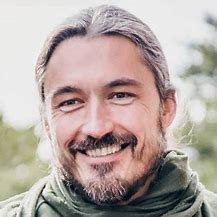 Thomas | What I see in your Theory U model is, I see the presencing and the source space is the space where we can rewrite evolution or human history while we are living it. It’s kind of a rewriting process. It’s like you can change the letters in the presence.
Thomas | What I see in your Theory U model is, I see the presencing and the source space is the space where we can rewrite evolution or human history while we are living it. It’s kind of a rewriting process. It’s like you can change the letters in the presence.
And the presence is also like the timelessness you experience in deep contemplation or meditation; it is actually the only way to see the current structures or possibilities or tendencies. And through an awareness process, bring in a new possibility, a new imprint. And it’s also my experience in the facilitation of large group collective trauma processes, that actually, ‘staying with’ is such a refined process. Just sometimes ‘staying with’ the transference patterns of people on to us, and what a person radiates in their inner architecture of the nervous system into the environment, and which tendencies a person radiates into his or her environment is affecting the environment. And I think that’s only possible in a state of presence.
But the past that we often talk about is the unintegrated history that becomes the ‘other.’ And in your words, with the absencing, it becomes the blaming—it becomes not being able to include, like othering. But also othering in space time, in the future, in the past. We fragment life. And the past is the unintegrated energy that affects me right now. Fears that affect me now. And that’s why the function that we talk about—‘staying with’—sounds, at the beginning, very simple. But in fact, is one of, I believe, the most complex functions that a facilitator basically needs to learn and express through experience.
‘Staying with’ is the capacity to witness creation. Because if you’re only in creation, you’re blind. You’re blinded by it, because you can’t see creation. So, you need contemplative practices in order to be able to witness and presence the process of creation.
 Otto | That is so interesting, Thomas. So, what comes to my mind listening to you is, the ‘staying with.’ It may look a little bit as if absencing is the opposite of presencing, but that’s not true. In reality, the presencing is grounded in the ‘staying with,’ and in the deeper connection, and holding the space.
Otto | That is so interesting, Thomas. So, what comes to my mind listening to you is, the ‘staying with.’ It may look a little bit as if absencing is the opposite of presencing, but that’s not true. In reality, the presencing is grounded in the ‘staying with,’ and in the deeper connection, and holding the space.
You could say fear is—you get too small—and then there’s really nothing. And the opposite of that is fanaticism. But courage is the holding of the space in between. Presencing is not the opposite of absencing. It’s kind of the middle way. There are always two different forms in which absencing can manifest. And that’s also true for our current age. I can move too much into ‘anti-this, anti-that.’ That’s one problem, and how absencing shows up and, basically, moves into direct violence one way or another. And we see the uptick in violence. But the other form of absencing shows up and is enabled through cynicism. Through disconnect, through not caring. That’s why this ‘staying with’ is a real key capacity that we need to build. Not only on the level of the individual, but also on the level of the collective.
Thomas | How can we support systems to go through such a process?
Otto | ‘Staying with’ is grounded in a number of deeper holding capacities that I will talk about in just a moment. And that are really, I believe, critical enabling conditions for this larger shift of consciousness that is beginning to happen in our society right now; to really bring that to the level of impact or the level of scale that’s necessary today. We have super-amplification in absencing through all kinds of social media and so forth. We do not have these amplification mechanisms on the presencing space. And what we need for that is awareness-based social technologies that make a system sense and see itself. . . . So, that’s kind of what we have been developing over the past 15 years, mostly through experimentation at the Presencing Institute.
And this is just one method that we have been coming up with under the leadership of my colleague and cofounder of the Presencing Institute, Arawana Hayashi. It’s something we call Social Presencing Theater.
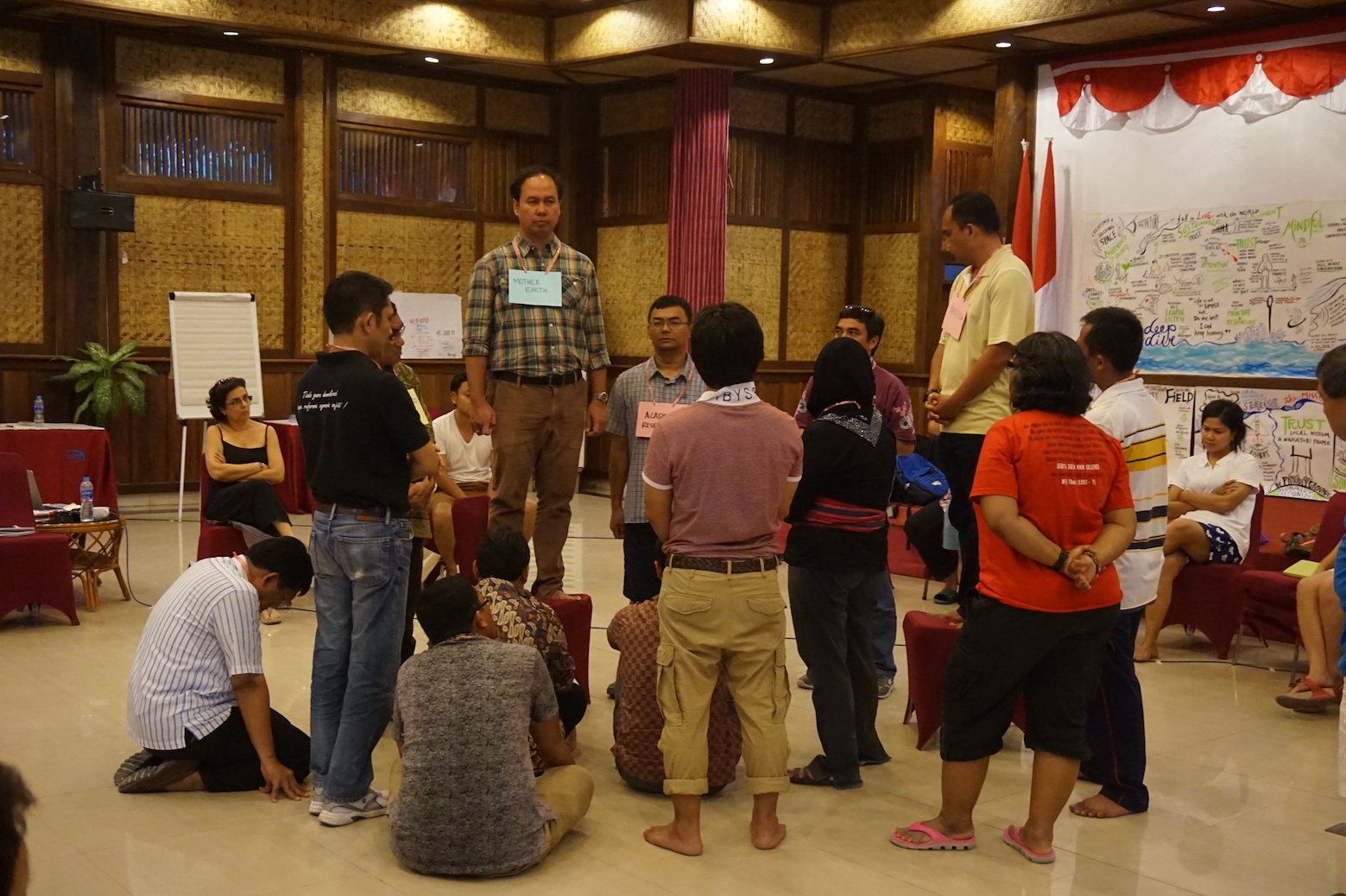
And based on what I said earlier—I talked about the ecological divide, the social divide, the spiritual divide—we always include these three roles. Ecological divide, how? The voice of Mother Earth.
And the social divide. How do you bring that in? Well, bring in the voice of the most marginalized people. That is, something different, someone different in each system. And then the spiritual divide is often kind of the voice of the future. It’s kind of the voice of the children, born or not yet born. It’s bringing in that. You need to step into the feeling of that role, and then you embody that with your body, with your gesture. And with a sentence that is summarizing that. And all that is being recorded and reflected on later.
So, it’s less facilitator driven and more like a collective mapping exercise that takes a deep scan into the deeper layers of the social system or the social field.
We need awareness-based social technologies that will allow us to move from individual to collective seeing. And from collective seeing to the deeper levels of sensing and connecting to source. And that’s in these tools. That’s the question of social technology to some degree. That often either we don’t have, or we don’t know exactly how to use. And that’s, I think, where we have a huge leverage point, because if these capacities build more, I think we’ll see a kind of shift from ecosystem to ecosystem awareness a lot more going forward. What comes to your mind, Thomas?
Thomas | I loved the emphasis on embodiment. Because if you go out on the street you might think, “Okay, everybody is in a body.” But actually, the amount of body that we do not inhabit, and that maybe we are not even aware that we are not inhabiting is, I think, bigger than we might expect. And so I love your emphasis on what it means to come into alignment with the body.
I think it’s very powerful. And also that it has the capacity to bring the future closer, so it has both dimensions. It’s this Global Social Witnessing, which practices how to find out how the system is aware of itself or not—through contemplative practices and the monitoring of the physical, emotional, and mental self.
Otto | Absolutely. The real result of such a process is that you switch on a capacity on the level of the collective. And that it has a lot to do with witnessing, which is switching on a higher level of awareness. And coming back to this question: so how do we actually deal with trauma? Not only by understanding the mechanism, but by creating transformative healing spaces.
A lot has to do with creating these holding spaces at a level that can really hold the complexity of very difficult and traumatic experiences of the past. And that has to do with the deeper capacity of unconditional witnessing. And then, as we deepen this process toward the open heart, there is this holding of the other. It’s not only seeing but you’re also holding the current moment that wants to emerge. Unconditional love as a second quality is really critical for building up these deeper spaces. And the third quality that we found really critical has to do with the gesture of supporting—being 100 percent in the service of the evolution of the other. And that is grounded in unconditional confidence. Unconditional confidence in the capacity of the other to step into his or her own highest possibility. But it’s also a confidence in the capacity of the collective.
So, the seeing, holding, and supporting is a way of how I relate to the other, that is based on collapsing the boundary between me and the other more and more. And really putting myself into the service and support of the evolution of another and the evolution of the collective.
Thomas | And also the unconditional confidence; that I really have the confidence in you doing your part of the orchestra and you playing your instrument well. And you’re trusting that, or you’re confident that, I am playing mine. That’s an amazing relief when nowadays, many people are paralyzed in the enormity of the global challenges and what they can do in such a situation. It seems meaningless. No, it’s not meaningless. Like when I’m one musician in the big philharmonic orchestra, my part is important. But I’m not playing all the parts. I would be totally overwhelmed if I had to play 30 instruments. But if I just have to play mine, but I am really passionate about playing mine, and you are passionate about playing yours, and then we are playing together and we’re listening to the conductor maybe, to the organizing principle of the system.
I’m very much looking forward to continuing this. There are so many more things I could now continue with. So, thank you so much, Otto. I don’t know if there’s anything you want to end this with?
Otto | I feel the same, Thomas. We’ll find ways to continue this conversation one way or another. Looking forward to that. Thank you so much.
This is an edited version of a conversation between Otto Scharmer and Thomas Hübl during the “Collective Trauma Online Summit” in October 2019.
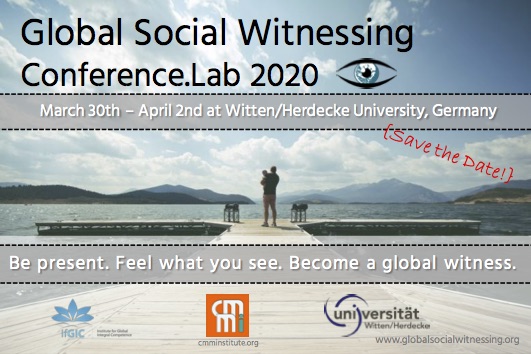 Both Otto and Thomas will be part of the Global Social Witnessing Conference.Lab, March 30th to April 2nd 2020, in Witten/Herdecke, Germany. There, they will continue their inspiring dialogue!
Both Otto and Thomas will be part of the Global Social Witnessing Conference.Lab, March 30th to April 2nd 2020, in Witten/Herdecke, Germany. There, they will continue their inspiring dialogue!
More information: http://www.globalsocialwitnessing.org
Collective Trauma Online Summit: https://collectivetraumasummit.com


